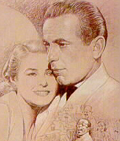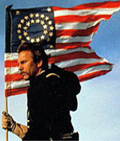|
Study Guide -
The Godfather (1972)
Director : Francis Ford Coppola
Stars :
Marlon Brando .... Don Vito Corleone
Al Pacino .... Michael Corleone
James Caan .... Santino 'Sonny' Corleone
Richard S. Castellano .... Pete Clemenza
Robert Duvall .... Tom Hagen
Sterling Hayden .... Capt. Mark McCluskey
John Marley .... Jack Woltz
Richard Conte .... Emilio Barzini
Al Lettieri .... Virgil Sollozzo
Diane Keaton .... Kay Adams
Abe Vigoda .... Salvadore "Sally" Tessio
Talia Shire .... Connie
Gianni Russo .... Carlo Rizzi
John Cazale .... Fredo
Preparation :
Read the movie review by Roger Ebert and "A Study in Ambiguity"
Historical/Social Significance :
"The Godfather was probably the first movie that brought the real-life cosa nostra and mafia to reality on the screen. The movie tells about poverty, the turn of the century, a family, and the hypocrisy of politics in America. It is a historical film, all the events are said to be true in one form or another, and it accurately depicts the era of pre and post World War II America. The Godfather teaches a real history of the intricacies of the Sicilian Mafia, the culture, the language (done in the true Sicilian dialect), it teaches about food, family, pride, and again the contradictions and the hypocrisy on so many different levels." (Sicilianculture.com)
"This mythic tragic film contributed to the resurgence in the American film industry, after a decade of competition from cinema abroad. Tom Dirks
This gangster film re-invented the gangster genre, elevating the classic Hollywood gangster film to a higher level by portraying the gangster figure as a tragic hero. Tom Dirks
The Godfather is an insightful sociological study of violence, power, honor and obligation, corruption, justice and crime in America. Tom Dirks
Synopsis :
The Corleone family is a close knit group that rules over a criminal empire in 1940's New York.
Guided Questions for Viewing :
Assessment questions will be based on the following :
-
"The novel can . . . be read as the struggle to protect a family and preserve it, no matter the cost, in a hostile environment. If the family is to be preserved, assimilation into American culture must be avoided, and this can be done only if the exact opposite happens: that is, America assimilates into the culture of the Don and his family"1 Comment on this statement with reference to the movie.
-
This gangster film re-invented the gangster genre, elevating the classic Hollywood gangster film to a higher level by portraying the gangster figure as a tragic hero. 2 Comment on this with reference to the film.
-
How are women treated in the movie? Describe the roles of the Don's wife, Sonny's wife, Connie and Appolonia.
-
The movie can be viewed as a tragedy about involving Michael's character. Describe the transformation that Michael goes through as the movie progresses.
-
One technique the film used to make the Corleone family seem more sympathetic was to make everyone around them in positions of power just as corrupt as they were. Comment on this statement with reference to the movie.
- How would you characterize the general feelings the Don exhibits for his family during the film? If you can, mention scenes which seem especially important in understanding the Donís feelings for his family.
- What does the term "Godfather" mean in the context of the film? What might people who call the Don "Godfather" expect from him? What might the Don expect from them? How does this relationship compare the family relationships you have already described?
- Why does the Don initially refuse to participate in the drug trade? What do you think is the intended audience response to the Donís initial refusal to participate in the drug trade?
-
The Godfather is told entirely within a closed world. That's why we sympathize with characters who are essentially evil. Comment on this with reference to the movie.
- How do the filmís creators manage to establish a man who has surely committed acts of perverse brutality as a fundamentally sympathetic character? For you as an individual viewer, does the Donís criminal involvement lessen the sympathy you feel for his character? Is he, in your mind, the filmís "good guy"? Explain your answers fully.
Sources:
1. Italian Signs, American Streets: The Evolution of Italian American Narrative. By Fred L. Gardaphe. Durham and London: Duke University Press, 1996.
2. Dirks, Tom. "The Godfather". filmsite.org/godf.html
Fordham, Geoff. "A Study in Ambiguity : The Godfather and the American Gangster Tradition". The Open University. http://www.crimeculture.com/Contents/Articles-Spring05/Godfather.html
Ebert, Roger. The Godfather www.rogerebert.org
|



